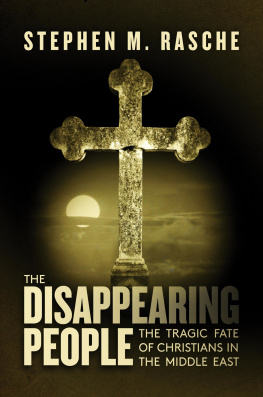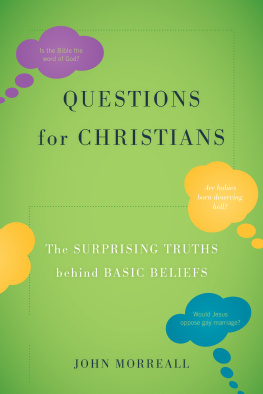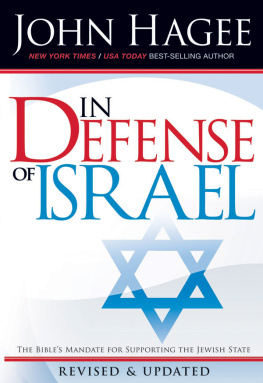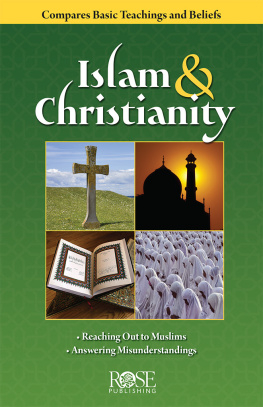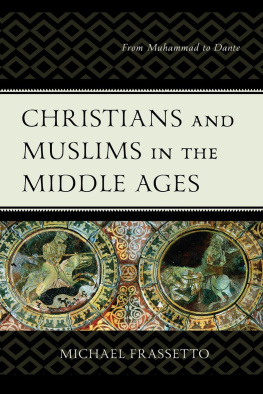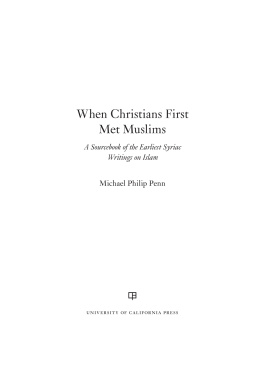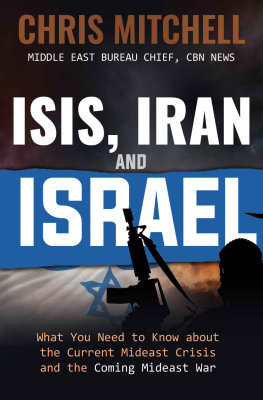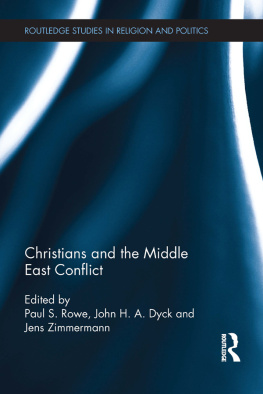Advance Praise for
THE DISAPPEARING PEOPLE
This is a beautiful, disturbing, awful story that needed to be told. It has been written with searing clarity and style by an American who moved to Iraq hoping to avert this tragedy. Read this book. It will change your view of Americas moral responsibility in the Middle East.
Thomas Farr, PhD, President, Religious Freedom Institute. Author, World of Faith and Freedom: Why International Religious Freedom is Vital to American National Security
This book is a powerful rallying cry to make the continued existence of Christians in Iraq a priority. In The Disappearing People , Stephen Rasche tells literal war stories from men and women a world awayincluding courageous priests prepared to be martyrs. For Americans and some of the rest of the West, Rasche holds up a mirror on what U.S. and other Western policies have done to Christians and how our bureaucracies often havent helped. And we are going to have to answer for looking away. Rasche has captured an important history hes been a critical part of. And we all need to be a part of their futureand now or there will be no tomorrow for Christians in Iraq.
Kathryn Jean Lopez, Senior Fellow, National Review Institute and Editor-at-Large, National Review
Stephen Rasches book is the best ever written about the genocide of Christians and Yazidis in Iraq. It is powerful because it is personal. Rasche has listened to Iraqi people with compassion. He tells their stories with penetrating poetry. Always running under the surface is the agony of shared suffering. Always shining through is the inspiration of a man called to do justice. Illuminating every page is the love that brought Rasche to serve in Iraq, and that has compelled him to write this magnificent book.
Dr. Gregory Stanton, Founding President of Genocide Watch
Herein lies the story of Christians and Yazidis who have largely disappeared from their homeland in Iraq, told by a Good Samaritan who embedded himself in their hardships and did what he could to help. It is also the story of passersbymajor Western government institutionswho had the wherewithal to help but did not, and of a few smaller Western organizations who did stop to help but could not provide enough to prevent massive flight. In the end, it is an exhortation to the rest of us would-be Samaritans to wake up and respond to the suffering of these and all survivors of harsh denials of their religious freedom.
Daniel Philpott, Professor of Political Science,
University of Notre Dame
The Disappearing People provides a vivid account of an entire religious communitys near-extinction in the very place of its birth, the ancient Middle East, at the hands of Islamist extremists. By implication, author Stephen Rasche has also described an existential threat that confronts all of us, Muslim and non-Muslim alike. It simply remains to be seen whether we will heed his warning and act in time to prevent similar disasters from befalling those of us who dwell in blessed lands, seemingly distant from the horrifying chaos that engulfs so much of the Islamic world.
KH. Yahya Cholil Staquf, General Secretary of Nahdlatul Ulama, the worlds largest Muslim Organization, and Cofounder of the Global Humanitarian Islam Movement
A BOMBARDIER BOOKS BOOK
An Imprint of Post Hill Press
The Disappearing People:
The Tragic Fate of Christians in the Middle East
2020 by Stephen M. Rasche
All Rights Reserved
ISBN: 978-1-64293-203-4
ISBN (eBook): 978-1-64293-204-1
Interior design and composition by Greg Johnson, Textbook Perfect
No part of this book may be reproduced, stored in a retrieval system, or transmitted by any means without the written permission of the author and publisher.
This is a work of nonfiction. All people, locations, events, and situations are portrayed to the best of the authors memory.

Post Hill Press
New York Nashville
posthillpress.com
Published in the United States of America
To my Grandfather
Dr. Robert L. Rasche, ThD.
Contents
Until this hour we are hungry and we are thirsty, we are naked, we are abused, and we have no dwelling place, And we toil as we labor with our hands. They dishonor us and we bless; they persecute us and we endure. They accuse us and we beg them. We are as the scum of the world and the offscouring of every person until now.
1 Corinthians 4:1113
(Translation from Aramaic Bible)
O ver the past two decades, terrorists and sectarians have shredded the rich multi-religious and ethnic tapestry of Iraq. Violent Islamist extremists have driven the Christians and Yazidis from their homes with genocide, crimes against humanity, and war crimes. The Christian minority is now on the verge of extinction in their historic homeland.
Christians have been in Iraq since the very birth of the church. Some who were persecuted in Rome at the beginning of the Christian era even took refuge in what is now Erbil, in northern Iraq.
There were between 1.3 and 1.5 million Christians in Iraq before the US invasion in 2003. Taking advantage of the chaos that ensued, sectarians persecuted the Christians from the start of that ill-fated intervention. It was bad for religious and ethnic minorities under Hussein, but it has been immeasurably worse in the aftermath. The Christian population had been driven down to 500,000 before ISIS began its genocidal campaign. Now just a small remnant remains.
The current tragedy has transpired against the backdrop of a centuries-old persecution of minorities combined with the ever-simmering sectarian conflict between Sunni and Shia Muslims. A tenacious Sunni minority dominated modern Iraq since the 1920s, and the dictator Saddam Hussein suppressed the Shia especially brutally. When the United States unseated Saddam, the tables were turned in favor of the Shia. Sectarian tension turned even more violent when Sunni Al-Qaeda in Iraq blew up the al-Askari Shrine, one of the holiest sites for Shia, in Samarra in February 2006. Religious and ethnic minorities, already subject to a long history of attacks, were caught between the combatants and targeted further.
When ISIS savagely drove Christians from their Mosul and Nineveh homelands in the summer of 2014, over 100,000 of them sought refuge in the semi-autonomous Kurdistan Region of Iraq. Most of these ended up in Erbil, the Kurdish capital, where it fell to the Chaldean Catholic Archdiocese of Erbil, under the leadership of Archbishop Bashar Warda, to provide food, shelter, and medicine to Chaldean and Syriac Catholics; Orthodox, Assyrian, and Armenian Christians; as well as to scattered groups of Yazidis and Muslims who sought help from Erbils Christian community.
The fate of Iraqi religious and ethnic minorities has also rested, in part, in other hands: the United Nations, the United States Agency for International Development (USAID) and State Department, other bilateral assistance programs, and a host of non-governmental relief agencies and church entities. As this book painfully describes, the global response has often been woefully inadequate.
In these agonizing years, what has it been like to be an internally displaced Christian in Iraq? What has it been like to be a bishop, priest, or layperson responsible for caring for internally displaced people (IDPs)? Stephen Rasches book searingly answers these questions.

